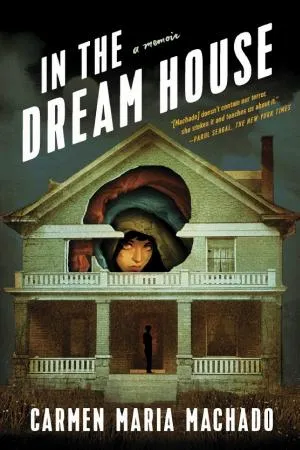
It’s not being radical to point out that people on the fringe have to be better than people in the mainstream, that they have twice as much to prove. In trying to get people to see your humanity, you reveal just that: your humanity. Your fundamentally problematic nature. All the unique and terrible ways in which people can, and do, fail. But people have trouble with this concept. It’s like how, after Finding Nemo, people who were ill equipped to take care of them rushed to buy clown fish and how the fish died. People love an idea, even if they don’t know what to do with it. Even if they only know how to do exactly the wrong thing.
That there’s a real ending to anything is, I’m pretty sure, the lie of all autobiographical writing. You have to choose to stop somewhere. You have to let the reader go.
When it was humid, the front door swelled in its frame and refused to open, like a punched eye.
I enter into the archive that domestic abuse between partners who share a gender identity is both possible and not uncommon, and that it can look something like this. I speak into the silence. I toss the stone of my story into a vast crevice; measure the emptiness by its small sound.
There is a Quichua riddle: El que me nombra, me rompe. Whatever names me, breaks me. The solution, of course, is “silence.” But the truth is, anyone who knows your name can break you in two.
As long as I can remember, I have been obsessed with physical and temporal limits. The beginning, the end. The first, the last. The edge. Once, when I was a kid, I stood in that wonderful sand right at the lip of the tide—the kind that could be wet and pliable or go hard like damp cornstarch—and yelled to my parents that I was standing on the line of the map. When they didn’t understand, I explained that there was a line on the map between the land and the water, and I was on it, precisely.
How to read her coldness: She is preoccupied. She is unhappy. She is unhappy with you. You did something and now she’s unhappy, and you need to find out what it is so she will stop being unhappy. You talk to her. You are clear. You think you are clear. You say what you are thinking and you say it after thinking a lot, and yet when she repeats what you’ve said back to you nothing makes sense. Did you say that? Really? You can’t remember saying that or even thinking it, and yet she is letting you know that it was said, and you definitely meant it that way.
In this way, the Dream House was a haunted house. You were the sudden, inadvertent occupant of a place where bad things had happened. And then it occurs to you one day, standing in the living room, that you are this house’s ghost: you are the one wandering from room to room with no purpose, gaping at the moving boxes that are never unpacked, never certain what you’re supposed to do. After all, you don’t need to die to leave a mark of psychic pain. If anyone is living in the Dream House now, he or she might be seeing the echo of you.
Even as you’re responding to him, even as you’re ordering and making small talk, you’re marveling at the fact that his maleness—the generic fact of it—has as much pull as a carefully curated, long-term abusive relationship. It’s as if one scientist spent decades developing a downward-facing propulsion system to get an apple to descend to the ground and another one just used gravity. Same result, entirely different levels of effort.
You were not always just a You. I was whole—a symbiotic relationship between my best and worst parts—and then, in one sense of the definition, I was cleaved: a neat lop that took first person—that assured, confident woman, the girl detective, the adventurer—away from second, who was always anxious and vibrating like a too-small breed of dog.
I left, and then lived: moved to the East Coast, wrote a book, moved in with a beautiful woman, got married, bought a rambling Victorian in Philadelphia. Learned things: how to make Manhattans and use starchy pasta water to create sauces and keep succulents alive.
But you. You took a job as a standardized-test grader. You drove seven hours to Indiana every other week for a year. You churned out mostly garbage for the second half of your MFA. You cried in front of many people. You missed readings, parties, the supermoon. You tried to tell your story to people who didn’t know how to listen. You made a fool of yourself, in more ways than one.
I thought you died, but writing this, I’m not sure you did.